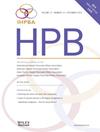Preferred content, construct, and duration of a fellowship structure in HPB surgery: a cross-sectional, pan-European survey among trainees and trainers
IF 2.4
3区 医学
Q2 GASTROENTEROLOGY & HEPATOLOGY
引用次数: 0
Abstract
Background
Fellowships in HPB surgery are lacking across Europe. The aim of this survey was to investigate preferences towards an HPB-fellowship structure among trainees and trainers.
Methods
A cross-sectional pan-European survey of trainees and consultants in HPB across Europe. Preferred content, duration and construct of a fellowship program was explored.
Results
Responses from 221 eligible participants were analysed, covering all European regions (40 % trainees, of which 31 % women). Preferred duration was 2 years (53 %), international availability (71 %) and in English language (by two-thirds overall; 74 % among trainees). A majority About two-thirds (63 %) preferred an official fellowship teaching curriculum provided by the E-AHPBA. Most The vast majority of participants (n = 211; 95 %) supported accreditation of HPB-fellowships by the E-AHPBA. Trainees reported higher priorities towards technical training (i.e. time in operating room; first surgeon opportunity; minimal-invasive technique training) than consultants, while time for non-operative activities (i.e. ward rounds; responsibility for multidisciplinary team meetings etc) was valued higher by consultants.
Conclusions
We identified preferences and needs towards construct and competence in HPB fellowships with strong support for involvement of E-AHPBA in providing a involvement teaching curriculum and accreditation. A unified HPB fellowship construct and registry across Europe guided by E-AHPBA may take this into consideration.
HPB手术中奖学金结构的首选内容、结构和持续时间:一项横断面、泛欧的实习生和培训师调查。
背景:整个欧洲缺乏HPB手术的研究。这项调查的目的是调查受训者和培训者对hbs研究金结构的偏好。方法:对全欧洲HPB培训生和顾问进行横断面调查。探讨了奖学金项目的优先内容、期限和结构。结果:对221名合格参与者的反馈进行了分析,涵盖了所有欧洲地区(40%为受训人员,其中31%为女性)。首选学习时间为2年(53%),国际可用性(71%)和英语语言(总体占三分之二;74%)。大约三分之二(63%)的人更喜欢E-AHPBA提供的正式奖学金教学课程。绝大多数参与者(n = 211;95%)支持E-AHPBA对hbs奖学金的认可。受训人员报告了技术培训的优先级(即在手术室的时间;第一外科医生机会;微创技术培训)比咨询医生多,而非手术活动(即查房;顾问更重视多学科团队会议等的责任。结论:我们确定了HPB奖学金在结构和能力方面的偏好和需求,并强烈支持E-AHPBA参与提供参与式教学课程和认证。在E-AHPBA的指导下,欧洲统一的HPB奖学金建设和注册可能会考虑到这一点。
本文章由计算机程序翻译,如有差异,请以英文原文为准。
求助全文
约1分钟内获得全文
求助全文
来源期刊

Hpb
GASTROENTEROLOGY & HEPATOLOGY-SURGERY
CiteScore
5.60
自引率
3.40%
发文量
244
审稿时长
57 days
期刊介绍:
HPB is an international forum for clinical, scientific and educational communication.
Twelve issues a year bring the reader leading articles, expert reviews, original articles, images, editorials, and reader correspondence encompassing all aspects of benign and malignant hepatobiliary disease and its management. HPB features relevant aspects of clinical and translational research and practice.
Specific areas of interest include HPB diseases encountered globally by clinical practitioners in this specialist field of gastrointestinal surgery. The journal addresses the challenges faced in the management of cancer involving the liver, biliary system and pancreas. While surgical oncology represents a large part of HPB practice, submission of manuscripts relating to liver and pancreas transplantation, the treatment of benign conditions such as acute and chronic pancreatitis, and those relating to hepatobiliary infection and inflammation are also welcomed. There will be a focus on developing a multidisciplinary approach to diagnosis and treatment with endoscopic and laparoscopic approaches, radiological interventions and surgical techniques being strongly represented. HPB welcomes submission of manuscripts in all these areas and in scientific focused research that has clear clinical relevance to HPB surgical practice.
HPB aims to help its readers - surgeons, physicians, radiologists and basic scientists - to develop their knowledge and practice. HPB will be of interest to specialists involved in the management of hepatobiliary and pancreatic disease however will also inform those working in related fields.
Abstracted and Indexed in:
MEDLINE®
EMBASE
PubMed
Science Citation Index Expanded
Academic Search (EBSCO)
HPB is owned by the International Hepato-Pancreato-Biliary Association (IHPBA) and is also the official Journal of the American Hepato-Pancreato-Biliary Association (AHPBA), the Asian-Pacific Hepato Pancreatic Biliary Association (A-PHPBA) and the European-African Hepato-Pancreatic Biliary Association (E-AHPBA).
 求助内容:
求助内容: 应助结果提醒方式:
应助结果提醒方式:


